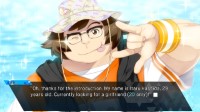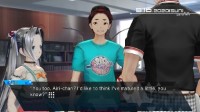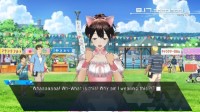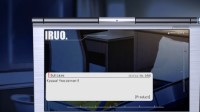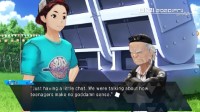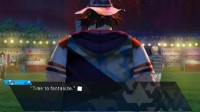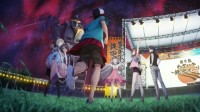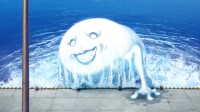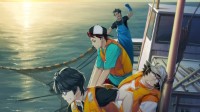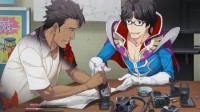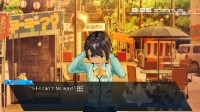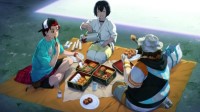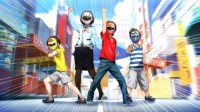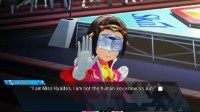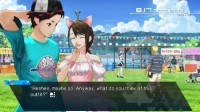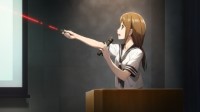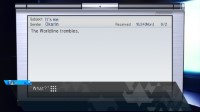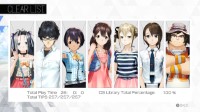Robotics;Notes DaSH
Playtime: 26 Hours
Finished 06 February 2025.Played the Switch release of this game pretty much immediately after finishing R;N Elite, since they were on the same cart. That means that I didn't have the community retranslations available to me in this game either - I noticed a number of minor issues, but really didn't have any serious problems with them in this game either. Again, I think any issues with this game tend to be about the overall plot & characters as opposed to granular issues with specific terms or dialogue lines.
Despite originally being billed as a proper sequel to R;N, DaSH ends up feeling more like a fandisk than anything. In its much shorter runtime, the game encompasses seven separate routes, including 5 timeline branches - 5 of which are side character routes and are thus technically non-canon. It's pretty obvious to see where this is going - all of the writing effort is split up, meaning that each one ends up having the depth of a puddle. While it is kind of nice to have a focus on the different characters (particularly Subaru, who didn't get anything in R;N despite having the most prominent role out of all the side characters), the canon route suffers for it, with it only being around 5-6 hours in length itself (and only around 3 hours when only counting the serious threat from Kimijima... again). There isn't enough time to set up the new disaster and its implications before it gets resolved, and as a result doesn't really feel like much of a threat. The other problem is that all of the very impactful character development from the individual routes is completely gone in canon, with all of the side characters being as stilted as they always were. Again, Subaru suffers significantly here.
Oh, more importantly, it's worth noting that Daru (from S;G) is the main protagonist of this game, coming to Tanegashima on a purported vacation. The game does a marvelous job of deconstructing his character, completely disregarding any development he should have had from a 9-year gap between S;G and this game, as well as the fact that he should have matured somewhat after marriage and a child. Instead, he immediately starts hitting on underaged girls and pretty much all of the R;N characters, culminating in a nice scene where he puts on a pair of sunglasses with technology to visually strip all of the girls in sight - including children. Did Epstein write this script? Why was this played off as comedy? Even though he miraculously still isn't as bad as Frau in this game, and his internal dialogue does have moments of maturity, every real moment still gets punctuated with some dumbass quip about advice or inspirational lines coming from eroge.
Thankfully, Kaito returns as a reformed secondary protagonist. This time around, 6 months after the end of R;N E, he's actually matured a ton as a character and realizes how immature and awkward he was during the events of the original Robotics;Notes. I'm a little bit sad that he mentions he's completely given up gaming to focus on studies, because it implies that people can't mature without dropping their love of games, but otherwise he has a real goal in life, and real determination to get there. It's nice to see that he didn't magically become super smart either; he's at a remedial school, not a top-level university or anything like that. I feel like his character growth is handled astonishingly well in this game, which is particularly ironic when juxtaposed with the regression of Daru's character alongside him.
Akiho's character isn't handled very well in this game. This really is a consequence of the decisions made in the original R;N, where they decided to completely sideline her character's importance and downplay any degree of skill that she should have had for some inconceivable reason. Somehow, after the original R;N, she completely lost her driving passion for robots, instead replacing it apparently with an overwhelming obsession with Kaito? Instead of pushing forward in her life as a mechanic, she decided to left turn to be a waitress to learn domestic skills... so she should could be a "more ideal girl" for Kai. What happened to literally anything that went on in her head for the last decade? Again, it feels like the writers don't consider Akiho to be an actual character so much as a tool of wish fulfillment for people internally roleplaying as Kai when going through this game. Maybe they'll get it right the third time.
The other characters still have their own issues that they work out in their individual routes, but as mentioned above, all of that "progress" effectively doesn't exist in canon anymore. It doesn't really feel like any of them (Subaru, Frau, Airi, Junna, etc.) have changed much if at all personality-wise despite the changes in circumstance and life situation, which makes me wonder why they decided the entire world would feel so static while Kai feels like the only one who isn't frozen in time. While that is a bit of an exaggeration, it's still close to the truth. Either way, I really liked Subaru's route, and Junna's route wasn't bad either. Airi's felt very strange, though not wholly terrible given a very reasonable motivation, and Frau's was pretty terrible as expected for her character.
The true route involves Kimijima's new scheme, which basically just feels like a random, out-of-place epilogue to a villain of the week. I mentioned this in my R;N entry, but I really don't think Kimijima is a good enough or compelling enough villain to use twice, but given the limited scale of this game (and the fact they wrote themselves into a hole in the first by saying he can duplicate himself) I guess they had no other real option. Either way, his new master plan to achieve technological singularity is introduced and stymied in the span of around 3 hours real-time, and about 2 or 3 days in game. It was pretty interesting for sure, and a decent-ish payoff from the 80% of the game spent on slice-of-life events, but it's not hard to see why people were disappointed by it.
At the end of the day, I'm really not surprised that this game has a terrible reputation. I think it had its high moments (again, Subaru's route is legitimately fantastic for his - and his father's - character development), but otherwise felt rushed and compressed, with little of interest to say. If anything, it shows that the fundamental concepts behind R;N were always flawed to begin with, and there isn't really enough in the world to justify any more follow-ups despite the decent roster of characters that it has.
